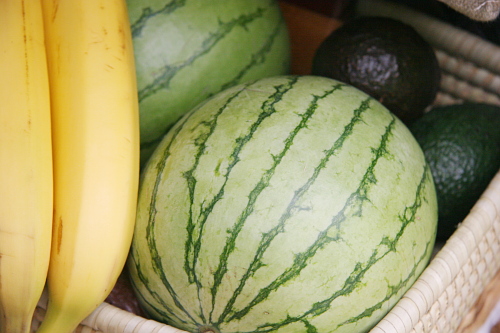I read an article this morning, at the Organic Consumers Association, that addressed the amount of worldwide food waste there is. It is absolutely shocking. It states that HALF of the food worldwide, is wasted after production. This happens during processing, in transport, while in storage and in people’s homes and at the table. With food waste there is also water waste, as huge amounts of water are used in the growing, processing and preparation of foods.
There has been quite a lot of coverage, in a number of news sources, about the impending food crisis. This article illustrates that this crisis is more a crisis of waste than a crisis of production.
“In the United States, for instance, as much as 30 percent of food, worth some US $48.3 billion, is thrown away. “That’s like leaving the tap running and pouring 40 trillion liters of water into the garbage can – enough water to meet the household needs of *500 million people,” says the report.
*that’s almost twice as many people as are in the entire US!!
In richer countries, such as the US and Europe, production is lower and waste is greater, putting strain on producing countries, who are also often poorer countries.
My mom was (and still is) a waste not kind of person. We stored and ate leftovers and she bought what we needed without unnecessary excesses. She also sponsored kids in poor nations, so it was not a foreign concept for me that there are others who are without the things we can take for granted. I remember in college, I witnessed the very wealthy parents of a friend of mine shovel salmon steaks and heads of broccoli down into the garbage disposal after her kids had (not) finished their dinner. I could not believe it!! and yet, this goes on in many homes in many cities across the globe.
What we do in our homes can seem small and insignificant to the larger population, but consider curbing your waste as a simple and direct way of providing a better diet for the poor and enough food for growing populations…
There are a number of simple ways NOT to waste food.
~ Bring your leftovers home when you do not finish your meal at a restaurant.
~ Bring foods you know you will not use to your local food share or food bank – many towns have these, even the small town near where we live, and the food will be dispersed to hungry and homeless people quickly and efficiently.
~ Take advantage of your local farmer’s markets. Food will come home fresher and will be more likely to be eaten before spoiling. This also decreases, over time, the demand for overseas shipment of foods grown far far away and all the diesel burned to transport it.
~ Store your leftovers for a meal tomorrow.
~ Go through your cupboards, fridge and freezer and clear out what you know you will not use. Bring these to food share if they are still useful.
~ Follow up the above tip with this: Take a weekly or monthly look through your cupboards, fridge and freezer for what might be getting close to their date and plan your meals around them so they can be used before they spoil.
~ Buy foods in bulk so you are able to purchase in the quantities that work for you household.


Leave a Reply